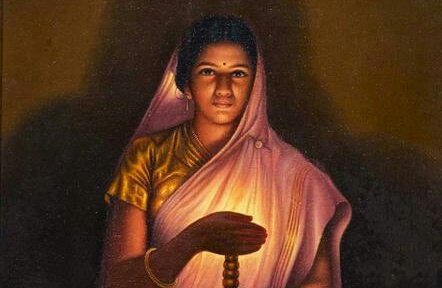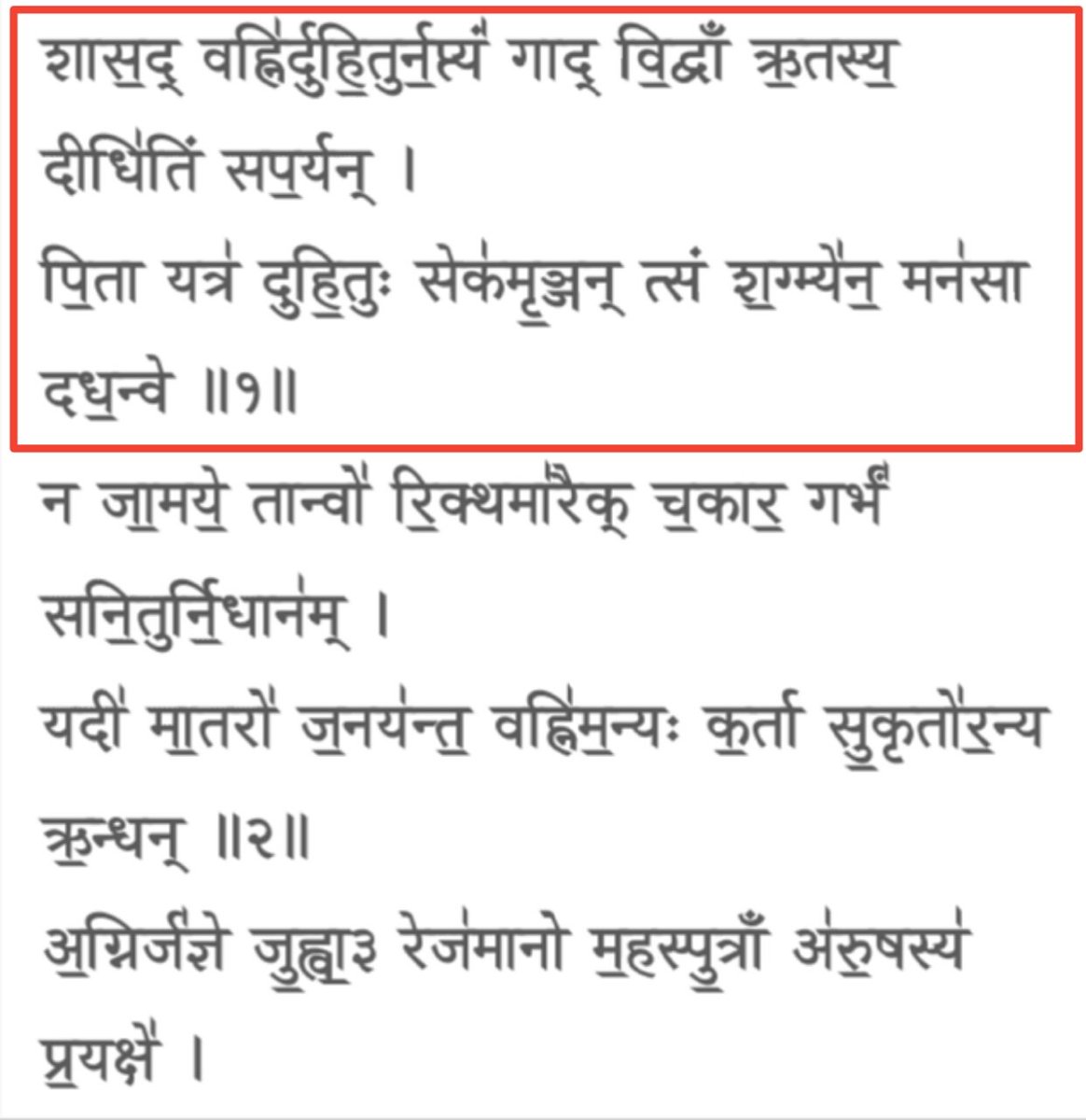Right to Property of Women in Sanatan Dharma
Women have the right to property in Sanatan Dharma. The Vedas and other Dharmic texts clearly state that women have rights in their father / husband& #39;s property. Here are some facts of evidence in support:
Women have the right to property in Sanatan Dharma. The Vedas and other Dharmic texts clearly state that women have rights in their father / husband& #39;s property. Here are some facts of evidence in support:
The Rig-Veda (3•31•1) शासद्वह्निर्दुहितुर्नप्त्यं गाद्विद्वाँ ऋतस्य दीधितिं सपर्यन्। commands that a son-less father accepts son of his daughter as his own son i.e. all properties of a son-less father shall be inherited by son of his daughter.
The Soulless father, who is the upholder of the family, refer to his grandson(the son)of his daughter n relying the efficiency of the Yajna, honour(his son in law)with various gifts.Father, trusting to the impregnation of the daughter, support himself with peaceful n happy mind.
Rig-Veda (3•31•2) commands that if parents have both son and daughter, son performs pindadaan (after death of father) and daughter be enriched with gifts.
न जामये तान्वो रिक्थमारैक्चकार गर्भं सनितुर्निधानम्। यदी मातरो जनयन्त वह्निमन्यः कर्ता सुकृतोरन्य ऋन्धन्॥
न जामये तान्वो रिक्थमारैक्चकार गर्भं सनितुर्निधानम्। यदी मातरो जनयन्त वह्निमन्यः कर्ता सुकृतोरन्य ऋन्धन्॥
O men! One mother who does not give wealth to her son-in-law, she upholds the distribution and then provides the impregnation (through marriage) to her daughter. As the fire accomplishes other things, the same way a mother bears noble performers of good deeds.
Rig-Veda (2•17•7) also attests share of a daughter in property of her father.
अमाजूरिव पित्रोः सचा सती समानादा सदसस्त्वामिये भगम्। कृधि प्रकेतमुप मास्या भर दद्धि भागं तन्वो३ येन मामहः॥
अमाजूरिव पित्रोः सचा सती समानादा सदसस्त्वामिये भगम्। कृधि प्रकेतमुप मास्या भर दद्धि भागं तन्वो३ येन मामहः॥
Son and daughter have equal status
महर्षि मनु is the first Lawgiver to have ordained that son and daughter enjoy an equal status in the family. He has also given this concept a constitutional validity.
महर्षि मनु is the first Lawgiver to have ordained that son and daughter enjoy an equal status in the family. He has also given this concept a constitutional validity.
यथैवात्मा तथा पुत्रः पुत्रेण दुहिता समा ।
तस्यां आत्मनि तिष्ठन्त्यां कथं अन्यो धनं हरेत् ॥
Manusmriti 9/130
The son is as one’s own self, and the daughter is equal to the son; hence so long as she is there in her own real character, how can anyone else take his property?
तस्यां आत्मनि तिष्ठन्त्यां कथं अन्यो धनं हरेत् ॥
Manusmriti 9/130
The son is as one’s own self, and the daughter is equal to the son; hence so long as she is there in her own real character, how can anyone else take his property?
मातुस्तु यौतकं यत्स्यात्कुमारीभाग एव सः ।
दौहित्र एव च हरेदपुत्रस्याखिलं धनम् ॥
Manusmriti 9/131
Whatever may be the separate property of the mother is the share of the unmarried daughter alone; and the daughter’s son shall inherit the entire property of the man who has no son.
दौहित्र एव च हरेदपुत्रस्याखिलं धनम् ॥
Manusmriti 9/131
Whatever may be the separate property of the mother is the share of the unmarried daughter alone; and the daughter’s son shall inherit the entire property of the man who has no son.
Equal partners in parental property
Manu regards both the son and the daughter as equal heirs toparental property. This opinion finds a mention in the Manusmriti.
Manu regards both the son and the daughter as equal heirs toparental property. This opinion finds a mention in the Manusmriti.
जनन्यां संस्थितायां तु समं सर्वे सहोदराः ।भजेरन्मातृकं रिक्थं भगिन्यश्च सनाभयः ॥
Manusmriti 9/192
When the mother has died, all the uterine brothers and uterine sisters shall divide the mother’s property equally.
Manusmriti 9/192
When the mother has died, all the uterine brothers and uterine sisters shall divide the mother’s property equally.
यास्तासां स्युर्दुहितरस्तासां अपि यथार्हतः ।
मातामह्या धनात्किं चित्प्रदेयं प्रीतिपूर्वकम् ॥
Manusmriti 9/193
Even to the daughters of those daughters something shall be lovingly given, as is quite proper, out of the property of their maternal grandmother.
मातामह्या धनात्किं चित्प्रदेयं प्रीतिपूर्वकम् ॥
Manusmriti 9/193
Even to the daughters of those daughters something shall be lovingly given, as is quite proper, out of the property of their maternal grandmother.
Thus it is clear from the Shastra Prmaan that Married or unmarried women inherited and shared properties. A Widow too is entitled to a share in the properties of the dead husband.
Moment of all my threads: https://twitter.com/vedicvishal/status/1277220170952392706?s=19">https://twitter.com/vedicvish...
Moment of all my threads: https://twitter.com/vedicvishal/status/1277220170952392706?s=19">https://twitter.com/vedicvish...

 Read on Twitter
Read on Twitter



